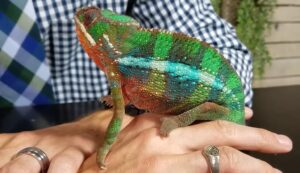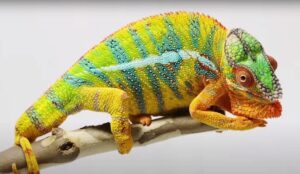Your chameleon may be sleeping a lot due to illness, stress, or inadequate habitat conditions. Excessive sleep can signal a health issue or environmental problem.
Chameleons are captivating creatures, known for their vivid color-changing abilities and distinctively languid movements. As cold-blooded reptiles, they rely on external heat sources to regulate their body temperature. A well-maintained habitat is crucial for their well-being, with the right balance of heat, light, and humidity mimicking their natural environment.
A chameleon’s behavior often reflects its health and comfort levels, with sleep patterns serving as a telltale sign. Normal sleeping habits suggest a happy and healthy pet, whereas deviations can indicate potential issues. Animal enthusiasts and reptile pet owners should closely monitor their chameleon’s sleeping patterns, as too much sleep, especially during the day, often raises a red flag about their overall health and habitat suitability.
Chameleon Sleep Patterns
Chameleons, the masters of disguise, also have sleeping habits that intrigue pet owners. Observing their patterns can shed light on their health and well-being. But what happens when your chameleon seems to be sleeping more than usual? Understanding their natural sleep cycles and the importance of rest is essential in ensuring they lead a healthy life.
Natural Sleep Cycles
Chameleons are diurnal, meaning they’re active during the day. As night falls, they slow down and prepare to sleep. Typically, a healthy adult chameleon should sleep 12 hours at night, coinciding with the natural decrease in light. Juveniles sleep even more, which supports their growth. Their closed eyes during the day could signal an issue.
Significance Of Adequate Rest
Rest plays a crucial role in a chameleon’s life. Sleep is essential for their immune system and overall health. It’s when they recover from the day’s activities, repair their tissues, and conserve energy. Lack of sleep can lead to stress, which makes them more prone to illness. Therefore, making sure your chameleon gets enough sleep is vital.
Identifying Excessive Sleep
If you notice your chameleon snoozing more than usual, it might ring alarm bells. Identifying excessive sleep in your pet can unlock clues to their health and wellbeing. It’s crucial to distinguish when this behavior strays from the norm and signals a bid for help. Let’s dive into understanding the sleep patterns of these colorful reptiles.
Normal Vs. Abnormal Sleeping Habits
Chameleons are diurnal, meaning they’re active during the day and rest at night. A healthy chameleon typically sleeps as darkness falls and awakens with the morning light. Excessive daytime napping or lethargy can be signs of illness or stress. Spotting these changes early ensures you can take swift action.
Monitoring Your Chameleon’s Activity
Keep a close watch on your pet’s daily routine. Tracking their active hours versus resting periods helps notice deviations quickly. Changes in their environment like temperature fluctuations or lighting issues can influence sleep habits. Consistent observation will inform you when your chameleon’s slumber becomes a concern.
| Activity | Normal Behavior | Potential Concern |
|---|---|---|
| Daytime Napping | Rare and Brief | Extended and Frequent |
| Reaction to Light | Wakes up with light | Stays asleep despite light |
| Energy Levels | High during day | Low and Lethargic |
- Check the habitat temperature – it should mimic a natural environment.
- Assess lighting – ensure UVB lamps work correctly.
- Observe eating habits – changes in diet can affect energy.
- Note changes in skin color or texture – often linked with health.
Remember, your pet’s unusual sleep patterns could be their way of saying, “I need care.” Keep logs, monitor behavior, and consult with a vet if needed. Your vigilant care can ensure your chameleon lives a happy, vibrant life.
Factors Impacting Sleep
Chameleons, the charismatic color-changers of the reptile world, have unique sleep patterns that raise questions for their owners. Understanding the reasons behind your chameleon’s sleep habits is crucial to maintaining their health and happiness. Let’s explore the factors impacting sleep in these intriguing creatures.
Environmental Influences
Various environmental aspects affect how much your chameleon sleeps. The light cycle is one of these factors, as chameleons need a clear day-night schedule to regulate sleep. Temperature plays a vital role too. If the habitat is too cold, your pet may sleep more to conserve energy. Excessive noise or disturbances can disrupt their sleep.
- Lighting: 12 hours of light, 12 hours of darkness
- Temperature: Daytime range of 72-80°F, nighttime drop to 65-70°F
- Noise: Limited to maintain a peaceful environment
Dietary Contributions
The right diet is as important to sleep as it is to wakefulness. A chameleon’s diet should mirror what they eat in the wild. This includes a mix of insects and plant matter. Low nutritional value in food leads to lethargy and increased sleep. Proper supplementation with calcium and vitamins is also crucial for maintaining good sleep patterns.
| Insects | Plant Matter | Supplements |
|---|---|---|
| Crickets | Collard Greens | Calcium |
| Mealworms | Mustard Leaves | Vitamin D3 |
Health Concerns Signaled By Oversleeping
Chameleons are active during the day and should not spend much time sleeping. If your chameleon is oversleeping, it might signal underlying health concerns. Various factors, including stress, poor diet, and illness, can change their sleeping patterns. Recognizing these signs early can help prevent more serious health issues.
Common Ailments
Several ailments can lead to excessive sleep in chameleons:
- Metabolic Bone Disease (MBD): A common result of inadequate UVB lighting or dietary imbalances.
- Infections: Respiratory or fungal infections can cause lethargy and increased sleep.
- Parasites: Internal or external parasites can drain your chameleon’s energy.
- Stress: Environmental stressors can disrupt sleep patterns and overall health.
When To Seek Veterinary Care
Pay close attention to your chameleon’s behavior. Seek veterinary care if you notice:
- Persistent oversleeping: Sleeping during the day for extended periods.
- Eating less: A sudden decrease in appetite or refusal to eat.
- Physical changes: Weight loss, discoloration, or swelling.
- Other signs of illness: Labored breathing, lethargy, or eye problems.
Timely veterinarian intervention can make a crucial difference for your chameleon’s health. Regular check-ups help catch issues before they escalate.
Improving Your Chameleon’s Sleep Health
Is your chameleon dozing off more often than usual? A good sleep cycle is vital for the well-being of these vivid reptiles. Long sleeping hours might hint at health issues or an inadequate environment. Let’s dive into ways to promote better sleep for your chameleon, ensuring it stays healthy and alert during waking hours.
Creating An Optimal Habitat
Chameleons thrive in spaces that mimic their natural habitat. Crafting a comfortable and suitable living space is key to their overall health, including sleep. Here’s what you need to know:
- Temperature: Maintain a temperature gradient from 72°F in the cool zone to 80°F in the basking area during daytime. At night, a drop to 65-70°F is ideal.
- Humidity: Aim for 50-70% humidity. Use a hygrometer to monitor levels.
- Lighting: Provide 12 hours of light and 12 hours of darkness. Use a timer to regulate the light cycle consistently.
- Vegetation: Include live plants for cover. This gives your chameleon a sense of security to sleep peacefully.
Adapting Feeding Schedules
Just like humans, what chameleons eat and when they eat can affect their sleep. Consistent and appropriate feeding times contribute to a healthy sleep rhythm. Consider the following:
| Age Group | Feeding Frequency | Time of Day |
|---|---|---|
| Babies | 2-3 times daily | Morning & Afternoon |
| Juveniles | Once daily | Morning |
| Adults | Every other day | Morning |
Adjust these timings to avoid late meals. Feeding too close to bedtime can lead to disrupted sleep.
Interpreting Chameleon Behavior
Chameleons are mysterious creatures with unique behaviors. Understanding why your chameleon sleeps a lot involves reading its body language. Their behaviors provide clues about their health and happiness.
Understanding Stress Signals
Chameleons show stress in various ways. Identifying these signs is crucial:
- Dark or bright colors – A stress signal.
- Aggressive posture – Mouth open, hissing.
- Trying to escape – Indicates discomfort.
Excessive sleeping could signal stress. Ensure their habitat feels safe.
Signs Of A Contented Chameleon
Happy chameleons have specific behaviors:
- Relaxed coloration – Indicates comfort.
- Closed eyes when held – Shows trust.
- Appetite for food – Sign of good health.
A contented chameleon may sleep soundly. Healthy sleep is normal.
Frequently Asked Questions For Why Is My Chameleon Sleeping So Much?
Why Does My Chameleon Sleep All The Time?
Chameleons often sleep a lot due to illness, incorrect habitat temperatures, or stress. Regular veterinary visits can ensure your pet’s health and proper habitat setup can prevent excessive sleepiness.
How Do I Know If My Chameleon Is Unhealthy?
Check your chameleon for signs of poor health, such as lethargy, discolored skin, weight loss, sunken eyes, or a lack of appetite. Unusual feces or unwillingness to eat can also indicate illness. Consult a veterinarian for concerns about your pet’s health.
How Do I Know If My Chameleon Is Unhappy?
Unhappy chameleons often display dark or dull colors, show a lack of appetite, and may exhibit restlessness or frequent hiding. They might also hiss or gape when approached, indicating stress or discomfort.
How Much Does A Chameleon Sleep?
Chameleons typically sleep for about 12 hours a night. Their sleep cycle aligns with the nighttime, matching their natural habitat conditions.
Conclusion
Understanding your chameleon’s need for extra sleep can prevent health concerns. Their sleep patterns might signal a need for dietary changes or indicate stress. Monitor their environment and consult a vet if sleepiness persists. Proper care ensures your chameleon stays healthy and active.
Keep an eye on your little friend!

